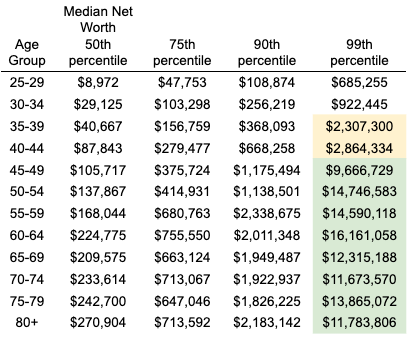Curious about how your net worth compares to others in your age group? This article explores the average net worth by age in America and provides insights into the factors that influence net worth. By understanding these figures and determining where you stand, you can gain valuable insights into your financial health and set appropriate net worth goals. Whether you’re in your 20s, 30s, 40s, 50s, or beyond, this article offers practical advice on how to improve your financial situation and increase your net worth over time. From debt management and emergency savings to smart investing and retirement contributions, discover the strategies to achieve long-term financial success. Do you ever wonder how your financial situation stacks up against others in your age group? Understanding your net worth and how it compares to others can provide crucial insights into your financial health and long-term goals. In this blog post, we’ll explore the average American net worth by age, discuss the factors influencing net worth, and guide you through setting net worth goals based on your life stage.
Knowing the average net worth by age can help you gauge your financial standing compared to your peers and serve as a benchmark for your financial planning. As a quick reminder, net worth is calculated by subtracting your total liabilities (debts) from your total assets (everything you own). Your net worth is important because it represents a snapshot of your financial situation at a given moment, and it can help you determine if you’re on track to achieve your financial goals or if you have a negative net worth that needs addressing.
Throughout this blog post, we’ll be referencing data from the Federal Reserve to provide average net worth numbers for various age groups. Keep in mind that these figures are based on household net worth and may not perfectly represent your situation. Nevertheless, they can still serve as a helpful starting point for understanding your financial health.
To calculate your net worth, you can use a net worth calculator or do it manually by listing all your assets and liabilities, with your net worth calculated as the difference between the two.
What is the Net Worth for Under 35 Years Old?
In the under-35 age group, the mean net worth is $76,300, while the median net worth might differ. This number may seem low, but it’s important to remember that individuals in this age group are typically in the early stages of wealth accumulation. They may have limited earning potential and be focused on paying off debts, such as student loans, establishing a budget, building credit, starting an emergency savings account, and starting a retirement fund.
At this stage, it’s crucial to take these steps to set a strong foundation for your entire financial picture and future financial success. By devising a budget and working on discharging debts, including credit card debt, individuals under 35 can improve their financial health and lay the foundation for future wealth accumulation. Developing good financial habits early on will set the stage for a stable financial future and a higher net worth as they progress through life, effectively managing their consumer finances.

This image is property of images.squarespace-cdn.com.
What is the Net Worth for Ages 35-44
The average household net worth for individuals aged 35-44 is approximately $436,200. During this stage, individuals often experience growth in their net worth as they advance in their careers, pay down debt, and accumulate more assets, such as savings and investments. Recommended financial goals for this age group include acquiring a home, starting a college savings plan for children, and increasing contributions to retirement accounts, such as bank accounts.
By focusing on these financial goals, individuals in their mid-30s to mid-40s can accelerate their wealth accumulation and set themselves up for a more secure financial future. Smart investing and disciplined saving at this stage are crucial to achieving a higher net worth.

This image is property of www.visualcapitalist.com.
What is the Net Worth for Ages 45-54
For individuals aged 45-54, the average net worth is $833,200. At this stage, people are often focused on maximizing their retirement account contributions and managing their financial responsibilities. One recommended retirement plan for individuals in this age group is maximizing company-offered 401k contributions and opening an IRA or Roth IRA, as well as considering money market accounts.
By prioritizing retirement savings and continuing to pay down debt, individuals in this age group can further increase their net worth and set themselves up for a comfortable retirement.

This image is property of cdn.dqydj.com.
What is the Net Worth for Ages 55-64
Individuals aged 55-64 have a mean net worth between $212,500 and $1,175,900. As people approach retirement, it’s essential to focus on paying off any remaining debts and adopting a balanced investment strategy to protect and grow their wealth. This will help ensure that their net worth continues to increase, even as they begin to rely more on their savings and investments for income during retirement.
Establishing net worth goals based on life stage is crucial for creating a financial plan that evolves with changing needs and priorities. By focusing on these goals, individuals can work towards a secure financial future and a high net worth.

This image is property of www.lexingtonlaw.com.
What is the Net Worth for Ages 65 and Older
The average net worth for individuals aged 65 and older is estimated to be approximately $1,217,700. Although net worth may gradually decrease as retirees rely on their savings and investments for income, maintaining a sound financial plan is crucial to ensure a stable financial future.
Factors influencing net worth for this age group include debt, emergency savings, income, and smart investment decisions. By focusing on these factors and working with a financial advisor, retirees can continue to manage their wealth effectively and enjoy their retirement years with financial peace of mind.
Now that we’ve explored the average net worth by age, let’s delve into the factors that can influence one’s net worth in America. These factors include debt management, emergency savings, income growth, and smart investing strategies. By understanding these factors and how they affect your net worth, you can make informed decisions to improve your financial health and achieve your financial goals.
Role of Debt in Net Worth
Debt plays a significant role in net worth, as repaying debts can lead to an increase in net worth and improved financial stability. Too much debt or a poor credit score can negatively impact your net worth due to the increased costs associated with borrowing money. Repaying debts can help increase your net worth over time. It’s important to manage your debt responsibly and make timely payments to maintain a healthy financial situation.
By focusing on debt repayment and using any additional funds to purchase or invest in assets that can appreciate over time, you can increase your net worth. Being diligent about paying off debts and maintaining a good credit score are essential steps in building a solid financial foundation.
Importance of Emergency Savings
Establishing emergency savings is critical for safeguarding your net worth and avoiding debt during unforeseen financial difficulties. An emergency fund serves as a financial buffer in the event of unexpected expenses or job loss and can be stored in bank accounts or other secure savings options.
By setting aside a portion of your income for emergency savings, you can protect your net worth and ensure that you’re prepared for any financial challenges that may arise. Building an emergency fund is an essential component of a solid financial plan and contributes to overall financial health.
How Increasing Income Impacts Net Worth
An increase in income can positively influence net worth by allowing for more funds to be allocated towards debt reduction, savings, and investment, such as money market accounts. There are several ways to increase your income, including career progression, supplemental occupations, and investments.
By focusing on increasing your income through these various means, you can accelerate your wealth accumulation and set yourself up for a more secure financial future. Higher income allows for more financial flexibility and makes it easier to achieve your financial goals.
The Value of Smart Investing in Growing Net Worth
Investing in stocks, bonds, and other assets prudently is essential for the growth of your net worth and the achievement of long-term financial objectives. By making smart investment decisions, you can grow your wealth and achieve your financial goals more quickly.
Prudent investing involves diversifying your investment portfolio, researching investment opportunities, and staying informed about market trends and news. By adopting these practices, you can maximize the growth potential of your investments and contribute to your overall financial health and net worth.
As we’ve seen, understanding net worth by age and the factors that influence it is crucial for creating a tailored financial plan that evolves with your changing needs and priorities. Setting net worth goals based on your life stage can help you stay on track and ensure that you’re making progress towards your financial objectives.
In your 20s, the focus should be on establishing good financial habits, paying off debts, building credit, starting an emergency fund, and starting retirement savings. By focusing on these areas, you can lay the foundation for a stable financial future and a higher net worth as you progress through life.
In your 30s and 40s, it’s important to prioritize saving and investing, increase the percentage of income saved, and manage growing financial responsibilities. By focusing on these financial goals, you can accelerate your wealth accumulation and set yourself up for a more secure financial future.
In your 50s and 60s, it’s essential to maximize retirement account contributions, pay down any remaining debts, and prepare for the transition to retirement. By focusing on these goals, you can continue to increase your net worth and set yourself up for a comfortable retirement. Consider working with a financial advisor to ensure that your investment portfolio is diversified and tailored to your risk tolerance and financial goals.
In retirement (65+), it’s important to safeguard and manage your wealth by maintaining an emergency fund, planning for Social Security payments, and adjusting your withdrawal strategies as needed. By focusing on these areas, you can protect your net worth and ensure a stable financial future throughout your retirement years. Working with a financial advisor can help you navigate the complexities of retirement planning, ensure that you’re making the best decisions for your financial situation, stay proactive in managing your wealth, and adjust your financial plan as needed.
By following these guidelines and understanding the average net worth by age and the factors influencing net worth, you can make informed decisions to improve your financial health and achieve your financial goals. Remember that everyone’s financial situation is unique, and it’s important to personalize your plan based on your specific circumstances and goals. With a proactive approach and a focus on long-term financial success, you can increase your net worth and build a solid foundation for your financial future.

This image is property of www.personalfinanceclub.com.
